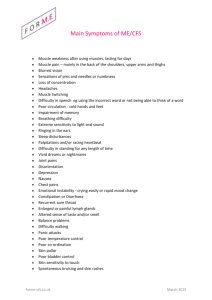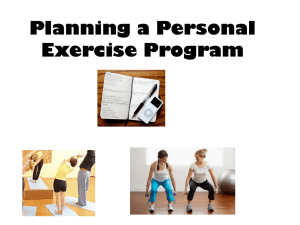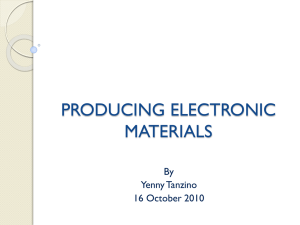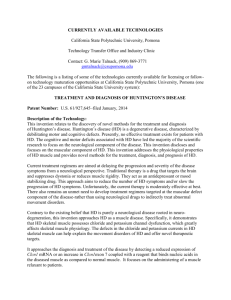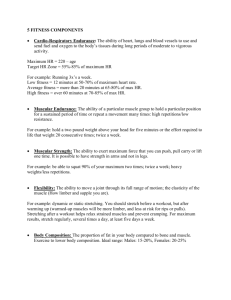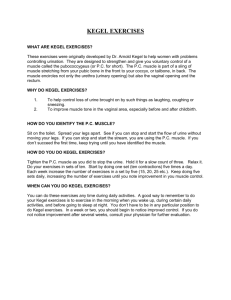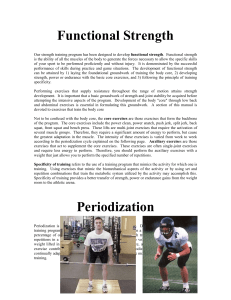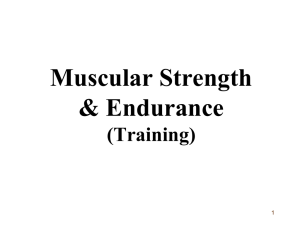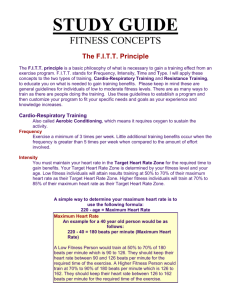DHVT Program Phase 2 – Dec 16-Feb 3 (8 weeks)
advertisement
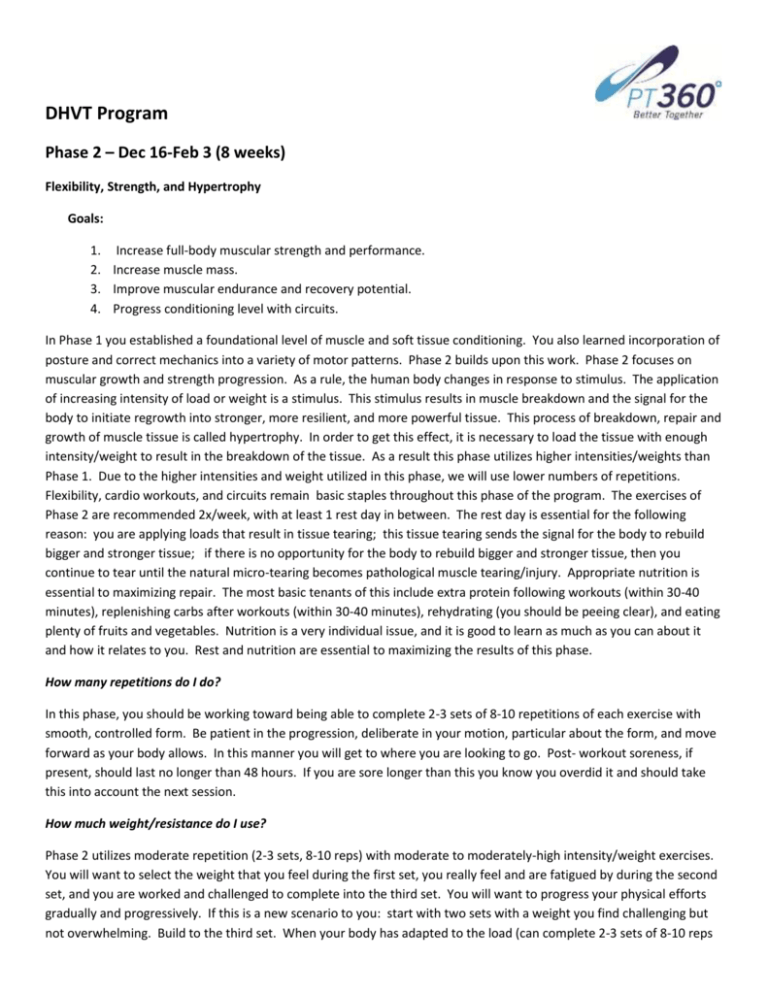
DHVT Program Phase 2 – Dec 16-Feb 3 (8 weeks) Flexibility, Strength, and Hypertrophy Goals: 1. Increase full-body muscular strength and performance. 2. Increase muscle mass. 3. Improve muscular endurance and recovery potential. 4. Progress conditioning level with circuits. In Phase 1 you established a foundational level of muscle and soft tissue conditioning. You also learned incorporation of posture and correct mechanics into a variety of motor patterns. Phase 2 builds upon this work. Phase 2 focuses on muscular growth and strength progression. As a rule, the human body changes in response to stimulus. The application of increasing intensity of load or weight is a stimulus. This stimulus results in muscle breakdown and the signal for the body to initiate regrowth into stronger, more resilient, and more powerful tissue. This process of breakdown, repair and growth of muscle tissue is called hypertrophy. In order to get this effect, it is necessary to load the tissue with enough intensity/weight to result in the breakdown of the tissue. As a result this phase utilizes higher intensities/weights than Phase 1. Due to the higher intensities and weight utilized in this phase, we will use lower numbers of repetitions. Flexibility, cardio workouts, and circuits remain basic staples throughout this phase of the program. The exercises of Phase 2 are recommended 2x/week, with at least 1 rest day in between. The rest day is essential for the following reason: you are applying loads that result in tissue tearing; this tissue tearing sends the signal for the body to rebuild bigger and stronger tissue; if there is no opportunity for the body to rebuild bigger and stronger tissue, then you continue to tear until the natural micro-tearing becomes pathological muscle tearing/injury. Appropriate nutrition is essential to maximizing repair. The most basic tenants of this include extra protein following workouts (within 30-40 minutes), replenishing carbs after workouts (within 30-40 minutes), rehydrating (you should be peeing clear), and eating plenty of fruits and vegetables. Nutrition is a very individual issue, and it is good to learn as much as you can about it and how it relates to you. Rest and nutrition are essential to maximizing the results of this phase. How many repetitions do I do? In this phase, you should be working toward being able to complete 2-3 sets of 8-10 repetitions of each exercise with smooth, controlled form. Be patient in the progression, deliberate in your motion, particular about the form, and move forward as your body allows. In this manner you will get to where you are looking to go. Post- workout soreness, if present, should last no longer than 48 hours. If you are sore longer than this you know you overdid it and should take this into account the next session. How much weight/resistance do I use? Phase 2 utilizes moderate repetition (2-3 sets, 8-10 reps) with moderate to moderately-high intensity/weight exercises. You will want to select the weight that you feel during the first set, you really feel and are fatigued by during the second set, and you are worked and challenged to complete into the third set. You will want to progress your physical efforts gradually and progressively. If this is a new scenario to you: start with two sets with a weight you find challenging but not overwhelming. Build to the third set. When your body has adapted to the load (can complete 2-3 sets of 8-10 reps with relative ease) progressively increase your intensity/weight. Please work within your own physical parameters. Repetitions must be completed with the following conditions met: use of deliberate motion, good form, full arc of motion, and no pain (of the injury sort). Please do not sacrifice form and health for intensity/weight. Please make sure you are limbered up and loose before you start loading. How long do I wait between exercise sets? The exercises are set up in an order that allows you to superset – this means you could theoretically go from one exercise to the next without fully stopping in between. The exercises are ordered in “opposite muscle groups” so as one group is resting the other is being worked. You may certainly rest in between exercise sets as your fitness level dictates, and I would encourage you to listen to your body. You can vary the order you go through the exercises (some days you may need to wait for equipment). If you do the same exercise more than one set in a row, rather than working through the list or alternating between exercises, I encourage you to take 60-90 seconds of rest in between sets to allow for muscle group recovery. Please take longer if you need to based upon fitness level. I see 2 Trunk Programs: “Progression I” and “Progression 2.” Which do I use? If you are able to negotiate Phase 1 -Trunk Progression 1 for 2-3 sets of 15 repetitions (and 2-3 front/side planks at full position for 30 seconds each) with good form, deliberate motion, and relative ease, then I encourage you to work from Phase 2 - Trunk Progression 2. Remember, this progression is loaded with weight, so please switch to 2-3 sets of 8-10 reps with resistance that makes you work as discussed above. Training Diary You may need to do some cutting and pasting to build your personal training diary depending upon your trunk program progression and exercise needs. This is a good thing to do. Keep track of what you are doing regardless of where you are on the spectrum. Training Buddy Yes please! Keep an eye on your teammate’s form. And keep an eye on those weights and situational safety. Call each other out if form is being sacrificed due to fatigue or too heavy a load. Keep each other safe. Move each other forward. Pay Attention to Pain Exercise can result in fatigue, discomfort, “muscle burn,” and sensations of intense exertion, and this is normal. Like stretching, there can be a whole lot of “ugh” but there should not be “ouch!” If an exercise or movement hurts, or for some reason does not feel like a good idea to you, please ease up. If easing up does not alleviate the situation, please stop. Please do not ignore pain. I am here as a resource so please let me know if you have a question or concerns about this. Modifications of exercises are available. Please Note: When you look at the Phase 2 Train Training Diary, you will notice that there are different exercises performed on the first and second days. Variety is the spice of life! And we embrace this in training. Pull-ups? For real?? Yes. There are two versions of pull-ups presented here. The first is done utilizing the Gravitron machine in the gym. This machine allows you to take off a % of your body-weight as assist to allow you to perform the motion. It allows you to gradually progress to your body weight. The other option shown utilizes a bar and your lower body for assist. The bar shown in the picture is at the Smith Press Rack in the gym, but any bar will do (including doorway bars at home!). Place the bar low enough that you can get into comfortable squat position, and lift with arms and push with legs to achieve the motion. Gradually use less assist from legs as upper body gets stronger. At home you can place a small step stool (with something underneath it so it doesn’t slip) for lower body assist. Easy grips: close, palms facing you/palms facing each other. More demanding grips: wider, palms facing away from you. Please start with just a few, use as much assist as you require for good form! Go slow, and have fun with it. Please get in touch if you have questions. Have fun! Jessica Hill MSPT DPT CSCS (802)860-4360, Jessica@PT360coop.com



